by Angela Smith | Nov 7, 2015 | Writing
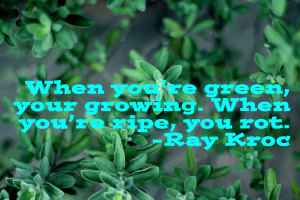
Writers should always be green and growing. Even those who have penned hundreds of novels or sold millions of copies should constantly be learning how to be better.
I believe the best way to grow is to read, and read a lot. Not so that you can steal other’s ways of writing, but to absorb their great knowledge. Stories and words, character arc and sentence structure, body language and emotion—reading how other writers do these can make writers more creative with their own.
No matter how much I think I might know about a certain writing topic, I love to read writer’s craft books to see how others do it and maybe learn something new. Even if I don’t take someone’s advice on plotting, I might learn something that helps me or reminds me.
That being said, I do have a few How-To-Write Books that I think all authors should have on their shelf. Here’s my top five:
1. On Writing, by Stephen King
Whether you love him or not, Stephen King is a master at his craft, and he knows how to tell a (frightening) story. His book is one of my favorites, because it speaks of his struggles as a would-be author before anyone knew who he was, and offers his own brand of advice. I can’t say enough about this book, but it helped me to be proud of who I am and what I write. He’s a genius, plain and simple, but he’s had his own struggles. I think admitting those is what makes him the brilliant writer he is.
2. Prosperity for Writers: A Writers Guide to Creating Abundance, by Honoree Corder
I love positive thinking books, and find them good reminders of how to change my thoughts. This book was much more than just a “think positive” book. It offers exercise, suggestions, and backstory of the writer’s life to help you recognize, understand, and get out of your own limiting beliefs and change your thought patterns when it comes to your writing.
3. Take Off Your Pants!: Outline Your Books for Faster, Better Writing by Libbie Hawker
Ugh, another plotting book you might think. It took me a while to buy this and read it, because of my fear of plotting and all the other books I’ve read in the past. I can’t tell you how many plotting books I’ve read that I haven’t been able to follow. And some that I’ve liked and will never read again. I love plotting books, love learning how other people plot. I am not a plotter, and usually when I plot I get way stuck! But this book was a nice epiphany on how to get my novel plotted, without really having to “plot” in the way I’ve known plotting to be n ways that normally suck out the enthusiasm for my story before it even starts. Also, some plotting books tell you they’ll teach you how to plot, but they really don’t. They just offer examples of plots of TV shows, etc. Loved this book, and will read it again.
4. The Emotion Thesaurus: A Writer’s Guide To Character Expression, by Angela Ackerman and Becca Puglisi
Every writer should have this book on their shelf.
5. Mary Buckham’s Writing Books
Seriously, there’s too many to list and they are all books that writers, especially beginners, should read. Her Active Settings and Active Hooks books are especially important. As a writer myself, I find that Mary Buckham’s books and courses are some of the best, as well as Margie Lawson. If you want to grow as a writer, read Mary Buckham’s books on writing.
by Angela Smith | Oct 31, 2015 | Writing
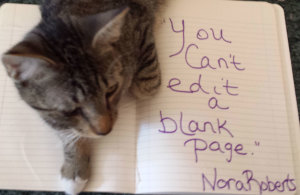
First drafts suck. “You can’t edit a blank page,” says Nora Roberts, as well as many well- known authors. And yet, why can’t I remember that?
Lately, I’ve been stuck on this scene, not because I’m stuck on what’s happening, but because it’s not perfect. And yet it’s my first draft.
It tends to happen to me a lot once I get to the middle. I’m editing this scene over and over again to make every emotional beat matter, instead of finishing the story and making notes for the 2nd draft (my normal chain of events if the heart continues to flutter and I can’t think of anything else).
I think I’m stalling. If I’m editing, then I’m still working on my story, but I don’t have to face that dreaded blank page. And it needs to be edited, right? Even if the experts say to write first, then edit. I’m stalling because I don’t know what to write next. The pages behind me are written, and I can keep going back to make them better. But the pages ahead of me are blank, and that’s scary.
My writer’s tip today is to just keep writing, push through that blank page. As much as I can edit what I’ve already written, I can’t edit a blank page. So if I don’t keep writing, I’ll have nothing left to edit!
by Angela Smith | Oct 24, 2015 | Writing
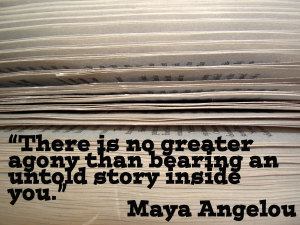
November is National Novel Writer’s Month. It’s when writers commit to writing everyday for an entire month for a total of 50,000 words. It takes place in November, which is the busiest time of the year. If you can write in November, you can write anytime, right?
I’m probably not going to do it again this year, but I wanted to talk about the setback and frustrations to motivate those thinking of taking on this daunting task. It’s a great way for would-be writers to write, and it’s also a great motivator for those already committed to writing, who might be suffering setbacks.
So for those of you who haven’t started writing but really want to, I challenge you to take on the NaNoWriMo. If you don’t think you can, don’t worry about word count. Just worry about getting words on the page. Even if it’s 100 words a day, or 5 minutes a day, it’s a daily word count and you’re getting somewhere.
My first NaNoWriMo experience was the best writing experience I’ve had yet, and I still can’t think of anything that compares. Every time I’ve tried it since, I have failed pretty significantly. I was in the middle of Final Mend and wasn’t getting anywhere with it. I unofficially took on the challenge of writing NaNoWriMo and mostly wrote first thing in the morning before my brain tackled the day’s activities. The words came out. Yes, it was a crappy draft and I had to go back and edit (much much later), but I finished my story and every moment when I wasn’t writing was an idea. The news sparked my brain to use certain events (i.e. flash floods), my daily life and emotions all sparked my creativity. It was like my mind was open and accepting of every idea in ways I could turn it to fit where I was stuck in my story. I wrote in the dark as a passenger with my husband driving as we went to an early morning doctor’s appointment. I wrote whenever I had an opportunity.
I haven’t always had that kind of success story and I’m not sure I ever will again. I’ve had another romantic suspense in my head since the beginning of time and tried to finish it during NaNo many a year, but so far it just wallows on my hard drive, unfinished. I started it during NaNo one year, and then it was just a great big puzzle piece I haven’t pieced together.
Some books are better left wallowing.
I loved every moment of my experience with finishing Final Mend during NaNoWriMo. And come to think of it, I am ready to start my newest Solace Ranch novella. NaNoWriMo might be the perfect opportunity.
by Angela Smith | Oct 17, 2015 | Writing
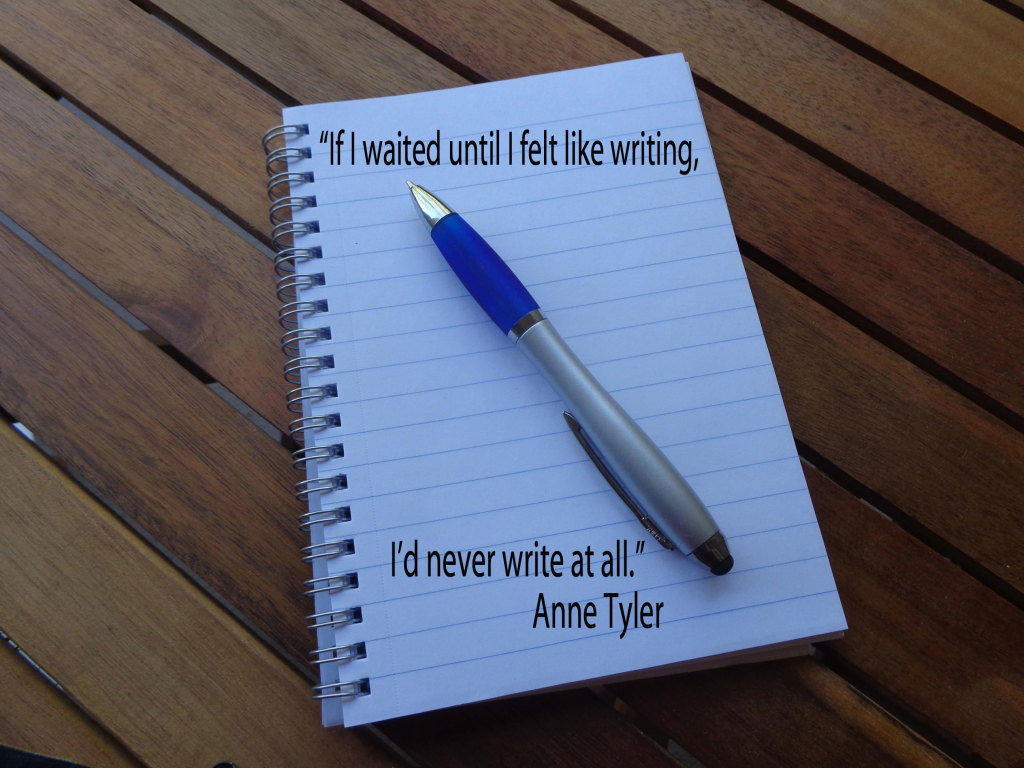
Welcome to Writersday, my first ever Saturday writing tips!
I’m always looking for inspiration. The motivation to sit butt in chair and write isn’t always that easy for me after working a long day and being completely brain dead. But recently I spoke with someone who dreams of writing, has always dreamed of writing but hadn’t made that opportunity for herself yet. Work, using all her creative energy at work, and feeling frazzled and brain dead at the end of the day keeps her from sitting down and do what she really wants to do.
Getting started is tough. Keeping going is tough.
Her comment made me realize that I can be that inspiration to others that I’m always looking for.
I’ve made it past that hurdle of publication. I written “The End” on a few books, have gone through the editing process, did all those things that those aspiring to start writing haven’t faced.
There are tons of how to write books out there, and I don’t think I’d be the right teacher for that. But many writers are curious to know how others do it. I know because I’ve always been curious, and I’m always wanting to learn. I believe that reading is the best tool a writer has, and I believe learning is the second best tool.
I don’t believe there’s a right way or a wrong way to write. Everything works differently for different people. Sometimes it works differently for me, depending on the day, the scene or even the book I’m writing. The only wrong way of writing is not writing at all. Heck, you can do it standing up, as long as you’re writing.
So today’s tip is a quote from Anne Tyler. You cannot wait until you are in the mood to write. If I waited until I was in the mood, I wouldn’t write near as often as I should. Those who wait until they are in the mood are hobbyists. If you want to make writing more than a hobby, you have to write!
So what are you waiting for?
by Angela Smith | Oct 12, 2015 | Guests
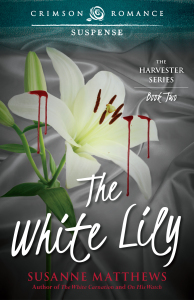
The Harvester is out there … watching, waiting, biding his time.
FBI cult specialist Lilith Munroe lives in dread that one day the man who tortured her when a case went bad will find her again. So leaving her sanctuary in Quantico to join the Harvester Task Force in Boston is her version of hell. But the Harvester is kidnapping babies, and Lilith’s profiling skills may mean the difference between life and death for the most innocent in society.
Australian millionaire and former member of the New Horizon commune Jacob Andrews returns to the United States searching for his sister. Instead of the happy reunion he expects, he discovers she is dead and his twin brother may be responsible. He agrees to lend his law enforcement skills to help find his former cult leader before the man can implement his plan to kill millions.
Now uneasy partners, Jacob and Lilith must learn to trust each other even as they fight their growing attraction. But when Lilith’s greatest fears materialize, will Jacob be able to set aside his anger and save the woman he loves?
Sensuality Level: Sensual
Buy Links
Amazon.com: http://www.amazon.com/White-Lily-Susanne-Matthews-ebook/dp/B015P79XZ0/ref=sr_1_1?ie=UTF8&qid=1443387932&sr=8-1&keywords=The+White+Lily+Susanne+Matthews
B&N: http://www.barnesandnoble.com/w/the-white-lily-susanne-matthews/1122682664?ean=9781440591228
KOBO: https://store.kobobooks.com/en-ca/ebook/the-white-lily
Excerpt:
“That must have been awful for her, for all of you.” Lilith said.
“It doesn’t matter now. Dying was probably the only way out Mom had. From that day on, Eloise’s life was hell. The other kids in the commune, including my cousins, made fun of her and said the burn was Satan’s mark on her—something they’d heard my uncle say—but when I was around they left her alone. When I confronted my uncle about that and other things, I ended up in the desert.”
He closed his eyes, seeing a tearful Eloise held back by her aunt as he was led out to be disciplined.
“Leaving my brothers and sisters wasn’t easy, but I figured Jimmy would step into the breach and protect Eloise. They’d always been close. The conversation with that boy got me thinking that maybe she’d somehow escaped from the commune, and I decided to look for her.”
“My God, knowing what her life was like, how could you do it? How could you walk away from that poor child and leave her there for eighteen years? And when you decided to look for her, you waited again. Why?”
The implication that if he’d come sooner he might’ve saved Eloise was clear.
“Because I was an angry, seventeen-year-old bastard who’d almost died, and I was too damn scared to go back,” he said through gritted teeth. “Don’t judge me, Agent Munroe. Until you’ve been brutalized as I was, you don’t have the right to.”
Her face paled, no doubt stunned by the viciousness of his attack, but he didn’t care. No one could possibly hate him as much at the moment as he hated himself.
“As for coming after her a few months ago, fate conspired against us. Andrew had a heart attack, and I made the choice to stay with him, a decision I refuse to regret. I hired a private investigator in Boston to find the girl with the tattoo. He found her right away, in mid-June. When I saw the picture, I knew it was my sister. She looks—I mean looked—like my mother. The PI arranged for me to contact her. She told me James had taken her to get that tattoo on her sixteenth birthday.”
“How did Eloise feel about seeing you again?” Her voice had lost its warmth, and her eyes were cold.
“She was surprised, but excited when I told her I wanted to bring her to Australia to live with me. She was worried about what might happen if my uncle discovered I’d survived and that she was planning to leave the States. I gathered from what she’d said that New Horizon had changed and not for the better. Through the man who’d found her, I made arrangements for her to get a passport and a ticket to Sydney.”
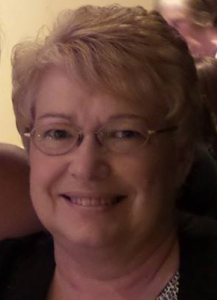
Susanne Matthews was born and raised in Cornwall, Ontario, Canada. She’s always been an avid reader of all types of books, but with a penchant for happily ever after romances. In her imagination, she travelled to foreign lands, past and present, and soared into the future. A retired educator, Susanne spends her time writing and creating adventures for her readers. She loves the ins and outs of romance, and the complex journey it takes to get from the first word to the last period of a novel. As she writes, her characters take on a life of their own, and she shares their fears and agonies on the road to self-discovery and love.
Follow Susanne on her: Website Blog Facebook page Twitter @jandsmatt
Amazon author page and Goodreads author page
by Angela Smith | Sep 17, 2015 | Books

by Angela Smith | Sep 12, 2015 | Introspective
My husband and I are still tending to remodeling our kitchen. We are close, so close that we picked out and (finally) agreed on the tile that is going on our countertop.
We walked into a tile shop totally by accident. We were driving down the access road and I saw this sign: Floor and Decor that indicated a flooring place. I have never heard of it, even after all my flooring research. My husband, who had missed the turn because he was in the middle lane and it was way too busy to try to scooch over, begrudgingly turned the next street over and drove down a back way to get pretty much exactly where we needed to go.
We found the tile, the perfect tile. And now I have high hopes of finally having a countertop.
Before that, we had gone to another flooring place and got to listen to a special workshop with free lunch. A free lunch with cookies. So I’d say it was the perfect day.
One of the speakers at the workshop was talking of hiring your contractor. Before she spoke, we ran into each other and told her we were doing this on our own. After listening to her talk, I realize how small of a project we have taken on compared to what she discussed. But wow, has it seemed huge.
Remodeling together really makes you appreciate your other half. Or not. I’m thinking he might be on the Or Not side with me, if only because I’m ready for things to be done and he goes at his own pace. But I am being patient, about as patient as a girl can be.
by Angela Smith | Sep 7, 2015 | Introspective
I stumbled upon this post the other day about women’s rights and living in the 1960s era, and what women in the 1960s were not allowed to do:
http://www.cnn.com/2014/08/07/living/sixties-women-5-things/
I thought it was very interesting because of Solace. Solace is a novella, the first in a series about soldiers returning from Vietnam. It is written in the late sixties, early 70s, and it tackles many issues that were faced in that timeframe: ongoing racism, animosity for war and the soldiers who fought in it, and women who were just finding their rights and, in some areas, still fighting for their rights.
In the small (and made up) town of Chapman Springs, Texas, women are fighting for their rights to work, to own their own businesses, and to be recognized as an important and individual part of society. At the same time, the Vietnam War is going strong and returning soldiers are struggling to adapt to their world when they return home. In Chapman Springs, a group is formed that does not support these soldiers, or these women. This group of men want to control Chapman Springs with an iron fist and see that nothing changes, nothing grows, and yet nothing remains the same. They are called the MAWB, men against women-owned businesses. And yet many people say they are against women and blacks, against the war and the soldiers returning from the war, and against anything that doesn’t conform to their beliefs.
I wasn’t even doing research at the time the above linked post made it on my homepage search engine, but I consider it a sign to keep writing the novella series I’m writing, especially at a time I was having doubts.
So thank you, CNN.
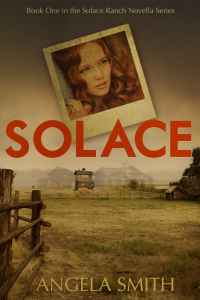
by Angela Smith | Sep 1, 2015 | Books, Introspective

I’m pleased to announce Solace, my first novella, the first in a series that I’m planning for a 12 novella series. Each book will be about a different Vietnam Vet who faces struggles as he returns home from war and, of course, finds love. Since all of the stories in this series are not written, it could always be more than 12. We’ll see.
A few facts about this novella:
Solace is available for pre-order and will be released October 27.
Solace is written in the Vietnam War era, a time I was not born in (I was born in the mid 70s, so it was almost over by then) but a time that has always infatuated me. Maybe because I was born so close to the time it was over and grew up hearing about it, watching movies about it, and seeing it on the news as I grew older? I’m not sure.
Solace is different from my other novels, because there is no harsh language or sex (What?), it is not romantic suspense, and it is about half of the length of my novels (hence being a novella).
Solace is a story that I had to tell, and since I’m having a hard time explaining why, I will defer to the author’s note I wrote and included at the front of this story:
Welcome to Brooklyn and Leath’s story! The first in a novella series set in the fictional town of Chapman Springs, Texas, during the Vietnam War era. Chapman Springs is a town not unlike many others in that day. Although I wasn’t born during this period, I’ve always been infatuated with the history of that era. Even still, I remember in the 80s some of the small towns in Texas and how brutal they seemed against differing opinions or different race.
Forgive me for any inaccuracies, as they are my own. Because I did not live in this era and everything I know is via research, it’s possible I made mistakes. I have talked to many Vietnam Vets, some who recall the horrors of, not what they faced in Vietnam, but what they faced when they came home. I’ve done a lot of research, and what I’ve learned tells me America is not proud of how they treated those soldiers. Still, we made it through and, hopefully, learned from our mistakes.
Sharing Brooklyn and Leath’s story was not an easy journey. They were two of the first characters I’d ever met when I first started writing, but the story I planned for them was not the right one, and they became silent for years. Once I finally figured out the story I was supposed to tell, it took me many more years to get up the nerve.
I have many people to thank for helping me on this story’s journey. But especially Teri French, who isn’t a lover of romance but helped me with the logistics, and Alexander Johns, for her careful critique and inspirational words; I wouldn’t have gotten this far without those inspiring words. Thanks for comparing me to Nicholas Sparks. That couldn’t have made me happier.
I loved writing this novella, and I hope you enjoy it, too! Please be sure to leave a review at Amazon, GoodReads, or other places to share your thoughts of the story and help other readers find me. Also be sure to look for more in this series set at Solace Ranch, a haven for war-torn soldiers who have returned from Vietnam. Feel free to join my newsletter, or find me on Facebook or Twitter to keep up-to-date with what’s coming next.
Thanks again! I’m excited to share Leath and Brooklyn’s story, so let’s get on with it!
The characters in Solace are the first ones I ever created when I started writing, but they’ve definitely taken a different journey than the one I had originally planned. I hope to tell you more about that later, but for now, I’ve got to go find dinner!
by Angela Smith | Aug 27, 2015 | Introspective

I’m a very visual person. I see everything in my head. If I read a story, I’m living it in my head. If someone is talking to me, I see the action as if I’m watching it happen right then. I even feel the emotions of what is happening when someone is telling me this story, or the emotions of the character I’m reading.
You’d think that would make me a better writer, or artist, or conversationalist, right?
Wrong.
As soon as I open my mouth, or get ready to write that scene, or attempt to do some type of creative artwork, I freeze. The image disappears. It’s like it stuck in some black hole and I can’t get it out. While writing, if I envision a scene too much, it becomes dead to me. I can’t tell you how many times I’ve visualized this beautiful artwork, and yet it falls flat in real life. I’m no artist, but the art I see in my head is pretty phenomenal. I’ve often wondered why I can’t get the image out of my head and into reality. As soon as I try to get any of it on paper, it falls flat.
It’s a question I might never have an answer to. I’ve taken those tests that tell you if you’re more visual or logical and usually see both ends. I often wonder if that’s my problem. I’m too much of visual (creative) and too much logical, but not enough of either. Sometimes I feel like I’m so stuck in the middle that I don’t have strong traits of either right or left, creative or logical.
Now they say the two brains work best together, but maybe that’s my problem. I haven’t figured out how to make them work together yet.
It’s a conundrum. Maybe I’m being too hard on myself, forcing the issue, but if that’s the case, I still haven’t figured out how to not force it.
What do you think?
by Angela Smith | Aug 21, 2015 | Introspective
For those who don’t know, Sandra Brown is my favorite author. Her writing conveys everything I’ve ever wanted for my own writing, and I found her in my teen years when I was only dreaming of writing romance. Every year, I wait patiently for her newest novel and esteem how she publishes one bestseller a year when the world now urges authors to publish, publish, publish.
I’ve gone to writer’s conferences just to hear her speak. Went to the Austin Book Festival just to have her sign my book and get a picture with her (unfortunately, that picture is long lost by now). Entered contests (cat caught reading contest won one year).
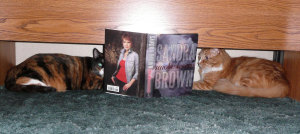
I haven’t reached stalker status, I promise, but even the other day my husband said “Oh, you must be reading the new Sandra Brown novel”. Her newest book came before finishing the last minute touches on a kitchen remodeling project we’ve spent months working on.
So why am I always depressed after reading her novels? Here are a few reasons:
The story is over
What will I do now? I’ll have to wait another year, unless I bring out the old ones. Which I’ve been known to do throughout the year. But right now I’m remodeling, and all my books are packed away somewhere I’m not even sure where to start searching. Thank God for libraries, Kindles, and bookstores, huh? One can never have too many Sandra Brown novels.
Her writing is better than I can ever dream of emulating
Okay, so she does inspire me to write better and think outside the box, but her years of experience and pure creativity seem like a distant dream to me. I do feel like I’m a better writer after reading her novels, along with a few of my other favorite authors, because their strong writing helps remind me to not be lazy in my own. But…who am I kidding? I’m a small pebble in a very large sea, drifting and weaving through an ocean of bestsellers and fighting to stay afloat. Bobbing for that next big story idea, and to be noticed.
Okay, it’s a bit overdramatic, but still.
I’ll never have a chance to sit down with her just to bask in her presence
I told you I’m not a stalker, and that is true, but just to have a conversation with her would be a dream come true. Maybe not quite as exciting as say, meeting Chris Hemsworth, but it’s close. I did meet her one year at a Dallas Writers Conference. She was the keynote speaker, and I approached her after her book signing (when she and her personal assistant were trying to pack up and get away) to let her know I enjoyed her speech and she was the reason I was there at the conference that day. It was a conference I’d never heard of until her posted schedule, and her speech was phenomenal. So were the things I learned in the classes.
She hasn’t gone so suspenseful that I can’t stand reading
That’s nothing to be depressed about, but one thing that could depress me (if I let it) is how some of my favorite authors have just gotten way too gritty and suspenseful, with very little romance and lots of blood and guts and gore and plot-driven detail. I love how Sandra Brown keeps the balance, even with some of her more thrilling novels, and I love how her stories are character-driven. I sometimes wonder if the (plot-driven) thriller romances are one of the reasons romantic suspense has been declining over the past few years. Genres go through its popular stages, but so many of the bestsellers are barely romance anymore. There are still lots of good romantic suspense stories out there, but Sandra Brown’s books really do have the perfect balance and is one reason I fell in love with romantic suspense so long ago.
What did I like about Sandra Brown’s newest release, Friction?
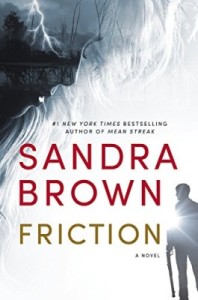 Hello? A Texas Ranger for a hero, and a judge who has the control of whether or not he gets his daughter back? What’s not to love? I especially loved this one because it is set in Texas, and because I have worked in criminal prosecution for 17 years as a legal assistant/office manager. I have met many Texas Rangers and many judges, and I love how she plays these two characters in such a realistic way. Her stories are always raw and edgy no matter what she does, and this one did not disappoint!
Hello? A Texas Ranger for a hero, and a judge who has the control of whether or not he gets his daughter back? What’s not to love? I especially loved this one because it is set in Texas, and because I have worked in criminal prosecution for 17 years as a legal assistant/office manager. I have met many Texas Rangers and many judges, and I love how she plays these two characters in such a realistic way. Her stories are always raw and edgy no matter what she does, and this one did not disappoint!
So I’ll get over my depression that the book is over and will eagerly await the next, as I always do. But if you haven’t read her yet and love a good suspenseful romantic thriller, what are you waiting for?
by Angela Smith | Jul 15, 2015 | Writing
It’s time for the annual RWA conference, which has changed many people’s lives, positively and negatively. Here I would like to offer tips to first-timers and long-timers alike to make this the most successful conference ever!
For the First-Timers:
The conference can be intimidating. Who am I kidding? It is intimidating. No matter how well prepped you feel you are, once you get there you probably won’t feel near as prepped and will want to run screaming and hiding in your room. That’s okay. If you are introverted, you should definitely take time for yourself. Even if you aren’t an introvert, you should take time for yourself.
So the first tip?
Take time for yourself.
Not just in the morning or evening. Sometimes during the day, when there’s a workshop you really want to attend but you can’t possibly, you just have to take a break. I made the mistake of trying to cram in all the workshops and then not getting near as much out of it as I could have, then I got way too tired and wanted to run home as fast as I could. Luckily I got some rest and reenergized myself.
Don’t keep your head down.
This is not the time to keep your head down. Make eye contact and smile. Be approachable, and approach others. If you are introverted and have to give yourself a pep talk, by all means do so.
Avoid sensory overload.
Beginners are told not to sleep in, don’t sight-see, and take every workshop you can. I disagree. There is such a thing as sensory overload, at least for me, where all that information turns into negative information. Audio recordings are a good investment for those times you must take a break. True, the actual experience can be better, but not always when you are already on sensory overload. Also, we are writers. Sight-seeing is the best possible thing we can do for our creativity, not sitting in a workshop. Personally, I think audio should be a gift to all RWA attendees.
Volunteer.
The second conference I attended, I volunteered, and it was the best experience of my life even if I had no idea what I was doing. I was afraid and almost talked myself out of skipping out on it, but a sense of self-perseveration guided me to finish what I had promised. I made a contact with a special friend and we still remain in contact.
We aren’t all the same, but that doesn’t matter.
Another piece of advice given to first-timers is that we are all the same. If we were all the same, well then none of this would matter, now would it? Take those experiences you gain from others to help strengthen yourself. Be a good listener, and a good learner, but remember to sift through the advice you are given. Not all of it is good, but some of it can be life-changing.
Don’t be afraid to ask.
I met a lot of fabulous people, some who might not ever remember me but authors who I hold a small crush for. Authors like Nora Roberts, Erica Spindler, Karen Rose, and Eloisa James. They changed my life without even knowing, and it’s not because I’m a crazy stalker fan girl. It’s because I was not afraid to approach them and ask for a picture. Eloisa James even said it’s the 21st century, you should never be afraid of asking for a picture!
Don’t miss out on opportunities.
I lost a lot of opportunities because I didn’t follow through, didn’t want to interrupt, or didn’t know how to forward the conversation. I also lost out a lot because I was too tired, or because someone might have offered a compliment (I love your shirt!) and I only said thank you without creating more conversation because they were involved in a group of people I didn’t want to interrupt. Well, if they said something to me, then I wasn’t interrupting them. Lots of other missed opportunities that I won’t bother mentioning but just remember not to miss out on your opportunities. No matter how intimidated or tired you might feel, remember why you are there, and make the most of it. Hiding in your hotel will not make the most of it, but don’t forget to rest.
Don’t overschedule yourself.
You don’t have to go to every workshop. Buy the recording or talk to someone who went to the workshop you wanted. Don’t be afraid to leave if a workshop isn’t giving you what you want. Also, remember that pitching can offer you opportunities to meet others, just don’t bother someone who is deep in their thoughts while getting ready to pitch. Remember to always offer encouragement.
Remember this conference won’t make or break you.
You no longer need an agent or editor to survive. There are a lot of freelance editors you can use to grow your career. If you get bad feedback from an agent or editor, remember they are just people, too. Maybe they’re having a bad day or maybe they just aren’t worth your time. Use constructive feedback to grow, but learn to toss negative or hurtful feedback. If that means you have to run and hide for a while, so be it, but keep your head up and don’t let it affect you for long!
Don’t let a negative experience talk you out of moving forward.
Okay, so I have a confession to make. When I went to D.C. in 2009, I was so excited and energized to go to my first RWA conference, something I had been dreaming of since forever! When I came away from that conference, I felt like a loser for not feeling near as energized and motivated as people convinced me I should be. Once I got home, I remembered some positive experiences, but I didn’t write or publish again for almost five years! I’m not blaming it on the conference, but I do feel like it greatly benefited the reasons I almost threw up my hands.
And for that reason, I am offering a few tips for long-timers.
For the Long-Timers:
Remember the first-timers.
First timers are told to network, speak up, learn and grow, blah blah blah. They’ll often go to bars, sit by themselves, order take-out for their room and run and hide, feeling like an outcast. It can feel like a high school full of cliques. The long-timers forget that a newbie might not want to approach a group of people because they don’t want to be rude and interrupt, or they don’t want to approach one person who has their head down in their phone or in a notebook or in the pages of a book. You might have your group you feel comfortable with, but remember we are all creative people, and sometimes going outside your clique, your comfort zone, could change your life. You never know what kind of newbie you might meet.
Remember the first-timers’ discomfort.
If a newbie doesn’t offer engaging conversation or respond the way you would like, maybe their mind is reeling with everything they’ve learned and everything going on. Maybe they are on sensory overload. Don’t take it personally or consider them a lost a cause. Continue to engage and offer inspiration, or recognize that they are too tired and it’s time for them to leave. Exchange contact information, and contact them!
We probably do want to talk to you.
If we have our head down and look engaged, we probably do want to talk to you. We are all here for the experience, and that experience is found in networking with others. Remember, a newbie feels much more intimidated than someone who has gone through this every year. You can be a good motivation.
Offer positive feedback.
Always be welcoming and encouraging. We aren’t in high school anymore.
Approach, and be approachable.
At RWA Nationals, there are a lot of private meetings going on in public locations. Newbies generally don’t feel comfortable approaching people who are engaged. If you have a meeting and are really talking to someone, then continue on. If you see someone alone, even if they are involved with their phone or with their head down, introduce yourself. But no matter how involved you are in anything, be approachable. You never know when the next experience—even one with a newbie—will change your life. We are writers, after all. Our experiences matter.
This is not a sales pitch.
We aren’t here to sell ourselves. We are here to network. If you find yourself only talking about yourself, maybe it’s time to step back and reevaluate the conversation. A lot of people talk about themselves because they are afraid of silence, but enjoy the momentary silence. Chances are, it won’t last long.
Does it really matter how we are enjoying our conference?
If you really wanted my opinion and I was honest about it, I’d tell you something different each time you asked, depending on how I’m feeling at the time. At one time, I hate it and want to run home. Another time, I’m loving it and never want the experience to end. Only once I’m home and able to process everything do I realize how much I enjoy it. If you use that line as an opener for someone just because you have nothing else to say, remember that might not be the best way and surely there’s something else you can ask. How many newbies ask you how you are enjoying your conference? Most of us don’t want to be honest. We love it later, once we process it all, but during the moment we might be extremely uncomfortable and don’t want to admit it, and you could be losing out on a potentially great conversation with going with the same old question.
Remember we aren’t all extroverts, but we all want to gain something from this experience. That means going outside our comfort zones.











